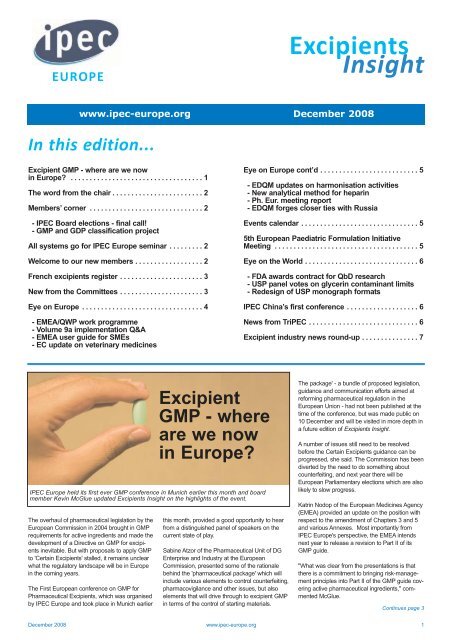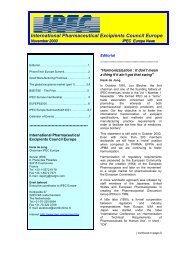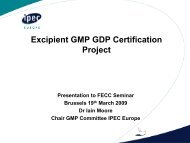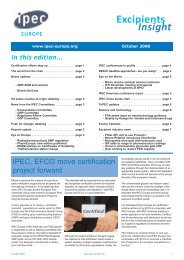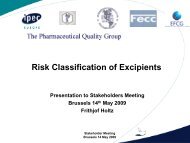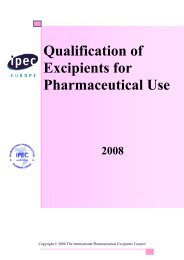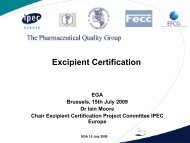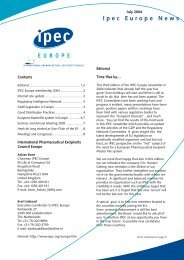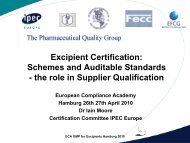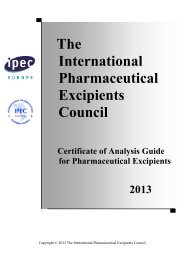Excipients Insight - IPEC Europe
Excipients Insight - IPEC Europe
Excipients Insight - IPEC Europe
You also want an ePaper? Increase the reach of your titles
YUMPU automatically turns print PDFs into web optimized ePapers that Google loves.
EUROPE<br />
<strong>Excipients</strong><br />
<strong>Insight</strong><br />
www.ipec-europe.org December 2008<br />
In this edition...<br />
Excipient GMP - where are we now<br />
in <strong>Europe</strong>? . . . . . . . . . . . . . . . . . . . . . . . . . . . . . . . . . . . 1<br />
The word from the chair . . . . . . . . . . . . . . . . . . . . . . . . 2<br />
Members’ corner . . . . . . . . . . . . . . . . . . . . . . . . . . . . . . 2<br />
- <strong>IPEC</strong> Board elections - final call!<br />
- GMP and GDP classification project<br />
All systems go for <strong>IPEC</strong> <strong>Europe</strong> seminar . . . . . . . . . 2<br />
Welcome to our new members . . . . . . . . . . . . . . . . . . 2<br />
French excipients register . . . . . . . . . . . . . . . . . . . . . . 3<br />
New from the Committees . . . . . . . . . . . . . . . . . . . . . . 3<br />
Eye on <strong>Europe</strong> . . . . . . . . . . . . . . . . . . . . . . . . . . . . . . . . 4<br />
- EMEA/QWP work programme<br />
- Volume 9a implementation Q&A<br />
- EMEA user guide for SMEs<br />
- EC update on veterinary medicines<br />
Eye on <strong>Europe</strong> cont’d . . . . . . . . . . . . . . . . . . . . . . . . . . 5<br />
- EDQM updates on harmonisation activities<br />
- New analytical method for heparin<br />
- Ph. Eur. meeting report<br />
- EDQM forges closer ties with Russia<br />
Events calendar . . . . . . . . . . . . . . . . . . . . . . . . . . . . . . . 5<br />
5th <strong>Europe</strong>an Paediatric Formulation Initiative<br />
Meeting . . . . . . . . . . . . . . . . . . . . . . . . . . . . . . . . . . . . . . 5<br />
Eye on the World . . . . . . . . . . . . . . . . . . . . . . . . . . . . . . 6<br />
- FDA awards contract for QbD research<br />
- USP panel votes on glycerin contaminant limits<br />
- Redesign of USP monograph formats<br />
<strong>IPEC</strong> China’s first conference . . . . . . . . . . . . . . . . . . . 6<br />
News from TriPEC . . . . . . . . . . . . . . . . . . . . . . . . . . . . . 6<br />
Excipient industry news round-up . . . . . . . . . . . . . . . 7<br />
Excipient<br />
GMP - where<br />
are we now<br />
in <strong>Europe</strong>?<br />
<strong>IPEC</strong> <strong>Europe</strong> held its first ever GMP conference in Munich earlier this month and board<br />
member Kevin McGlue updated <strong>Excipients</strong> <strong>Insight</strong> on the highlights of the event.<br />
The overhaul of pharmaceutical legislation by the<br />
<strong>Europe</strong>an Commission in 2004 brought in GMP<br />
requirements for active ingredients and made the<br />
development of a Directive on GMP for excipients<br />
inevitable. But with proposals to apply GMP<br />
to 'Certain <strong>Excipients</strong>' stalled, it remains unclear<br />
what the regulatory landscape will be in <strong>Europe</strong><br />
in the coming years.<br />
The First <strong>Europe</strong>an conference on GMP for<br />
Pharmaceutical <strong>Excipients</strong>, which was organised<br />
by <strong>IPEC</strong> <strong>Europe</strong> and took place in Munich earlier<br />
this month, provided a good opportunity to hear<br />
from a distinguished panel of speakers on the<br />
current state of play.<br />
Sabine Atzor of the Pharmaceutical Unit of DG<br />
Enterprise and Industry at the <strong>Europe</strong>an<br />
Commission, presented some of the rationale<br />
behind the 'pharmaceutical package' which will<br />
include various elements to control counterfeiting,<br />
pharmacovigilance and other issues, but also<br />
elements that will drive through to excipient GMP<br />
in terms of the control of starting materials.<br />
The package' - a bundle of proposed legislation,<br />
guidance and communication efforts aimed at<br />
reforming pharmaceutical regulation in the<br />
<strong>Europe</strong>an Union - had not been published at the<br />
time of the conference, but was made public on<br />
10 December and will be visited in more depth in<br />
a future edition of <strong>Excipients</strong> <strong>Insight</strong>.<br />
A number of issues still need to be resolved<br />
before the Certain <strong>Excipients</strong> guidance can be<br />
progressed, she said. The Commission has been<br />
diverted by the need to do something about<br />
counterfeiting, and next year there will be<br />
<strong>Europe</strong>an Parliamentary elections which are also<br />
likely to slow progress.<br />
Katrin Nodop of the <strong>Europe</strong>an Medicines Agency<br />
(EMEA) provided an update on the position with<br />
respect to the amendment of Chapters 3 and 5<br />
and various Annexes. Most importantly from<br />
<strong>IPEC</strong> <strong>Europe</strong>'s perspective, the EMEA intends<br />
next year to release a revision to Part II of its<br />
GMP guide.<br />
"What was clear from the presentations is that<br />
there is a commitment to bringing risk-management<br />
principles into Part II of the GMP guide covering<br />
active pharmaceutical ingredients," commented<br />
McGlue.<br />
Continues page 3<br />
December 2008 www.ipec-europe.org 1
The word from<br />
the chair<br />
All systems go for the <strong>IPEC</strong><br />
<strong>Europe</strong> Seminar and AGM<br />
Dear Members, December 18, 2008<br />
With the holiday season upon us, the<br />
<strong>Excipients</strong> <strong>Insight</strong> team is getting ready to log<br />
off, and grab a festive foie gras. This being<br />
the time of year for giving (and taking), it<br />
seems only right to start by thanking our<br />
members, our committees, the<br />
<strong>IPEC</strong> <strong>Europe</strong> secretariat for their<br />
relentless efforts and contribution to<br />
the success of <strong>IPEC</strong> <strong>Europe</strong>.<br />
With your help, a lot has been<br />
achieved in 2008: the creation of<br />
<strong>Excipients</strong> <strong>Insight</strong>, key for our communication<br />
and for your day to day<br />
activity, has given us a great tool to<br />
higlhight some of the key achievements <strong>IPEC</strong><br />
<strong>Europe</strong> and beyond.<br />
Our first <strong>IPEC</strong> <strong>Europe</strong> GMP conference, held<br />
earlier this month in Munich, which is also the<br />
subject of our feature article this month was a<br />
success. We had a fantastic turnout, with more<br />
than 100 participants in total, which reflected the<br />
high standard of the programme and speakers. It<br />
was particularly gratifying to see that 40 attendees<br />
were non-<strong>IPEC</strong> members, so the event fulfilled<br />
the key objective of communicating the<br />
issue to a wider audience. We also had valuable<br />
meetings with the Pharmaceutical Development<br />
Group (PDG) under the TriPEC banner, and<br />
agree long-term goals for the <strong>IPEC</strong> organisation.<br />
2009 promises to build on the momentum generated<br />
in 2008, and of course the <strong>IPEC</strong><br />
<strong>Europe</strong> Seminar and AGM will provide a<br />
great launchpad for our activities, and<br />
provide an opportunity to meet the new<br />
members who have joined us during<br />
2008. On that subject I’m sure you will<br />
join me in welcoming our latest recruits,<br />
Abbott Laboratories and SE Tylose (see<br />
below). I invite you to take a look at the<br />
seminar programme and, with just over a<br />
month to go before the event, encourage you to<br />
book your place as soon as possible.<br />
Thank you once again for your valuable input<br />
and support this year. I wish you a happy holiday<br />
season and look forward to welcoming<br />
you to Cannes in the New Year.<br />
On behalf of the <strong>IPEC</strong> <strong>Europe</strong> Board,<br />
Patricia Rafidison<br />
Chair to <strong>IPEC</strong> <strong>Europe</strong><br />
Hotel Majestic, Cannes, 22 & 23 January 2009<br />
The provisional programme of the 2009 <strong>IPEC</strong><br />
<strong>Europe</strong> Seminar is now available to view here,<br />
and once again promises to be a fantastic event.<br />
Representatives of EDQM and WHO will provide<br />
an update on their objectives and strategies.<br />
Supply chain and the excipient certification project<br />
are high in the programme, but many other<br />
interesting issues will be discussed, such as<br />
needs and expectations on excipient manufacturing<br />
in relation to Quality by Design (QbD);<br />
GDP/Excipient Pedigree; and paediatric formulations<br />
in relation to excipients.<br />
As time is marching on, we encourage you to<br />
book accomodation at your earliest convenience,<br />
as the Majestic hotel is expecting to be busy at<br />
the time of the seminar, and the Hotel Gray<br />
D’Albion has already run out of rooms.<br />
To register please contact the <strong>IPEC</strong> <strong>Europe</strong><br />
Secretariat at info@ipec-europe.org<br />
New <strong>IPEC</strong> members<br />
<strong>IPEC</strong> <strong>Europe</strong> is delighted to welcome two new<br />
member companies this month.<br />
Member’s Corner<br />
<strong>IPEC</strong> Board elections - final<br />
call!<br />
We would like to remind you that three positions<br />
within the Board are open for election in 2009<br />
(two for manufacturers and one for users). The<br />
election will be made at the next Annual General<br />
Meeting on 23 January 2009 in Cannes.<br />
All members interested must submit their candidature<br />
by email or fax to the <strong>IPEC</strong> <strong>Europe</strong><br />
Secretariat by 5 January, 2009, at the latest. The<br />
vote will be organised at the Annual General<br />
Meeting on 23 January, with the new Directors<br />
taking up their positions at the following Board<br />
meeting.<br />
For more information and/or to apply:<br />
Email: info@ipec-europe.org;<br />
Fax: +32 2 732 34 27<br />
GMP and GDP certification<br />
project<br />
The excipient certification project, run with the<br />
<strong>Europe</strong>an Fine Chemicals Group (EFCG),<br />
remains our top priority. <strong>IPEC</strong> Americas and<br />
<strong>IPEC</strong> <strong>Europe</strong> along with the Pharmaceutical<br />
Quality Group (PQG) are developing a GMP<br />
certification standard, scheme and auditor competency.<br />
GDP aspects will be covered by the<br />
GDP committee and the <strong>Europe</strong>an Association<br />
of Chemical Distributors (FECC).<br />
Communication of the benefits<br />
of this ambitious project is<br />
critical, so our congratulations<br />
go to Tim Boelke of EFCG for<br />
his polished video interview<br />
on certification given at CPhI in Frankfurt this year<br />
to www.in-PharmaTechnologist.com.<br />
Abbott is a global, broad-based health care<br />
company devoted to discovering new medicines,<br />
new technologies and new ways to<br />
manage health. Its products span the continuum<br />
of care, from nutritional products and laboratory<br />
diagnostics through medical devices<br />
and pharmaceutical therapies. For more information,<br />
contact Dr. Paul E. Knight.<br />
SE Tylose GmbH & Co. KG is one of the<br />
world-wide leading producers of cellulose<br />
ethers, and its products are used in almost all<br />
aspects of life. For more information, contact:<br />
Dr. Eckart Krämer.<br />
2 www.ipec-europe.org December 2008
Excipient<br />
GMP<br />
continued<br />
from page 1<br />
"We should remember that Part II is what everyone<br />
reaches out to as a guide for starting materials,<br />
and this in turn serves as an indication that<br />
the future of GMP for excipients will also likely be<br />
based on those principles."<br />
The revision of Chapter 5 - which includes sections<br />
on the qualification of suppliers and testing<br />
of starting materials - was in the 2008 workplan<br />
and would have affected excipients directly but<br />
has been delayed.<br />
FDA position<br />
If the EMEA is to apply risk-management principles<br />
across the board for its revision of GMP, it is<br />
aligning itself with the US Food and Drug<br />
Administration's position.<br />
<strong>Excipients</strong> are not approved by the FDA, even<br />
though they are officially defined as drug products,<br />
according to the agency’s Steve Wolfgang.<br />
However, the FDA creates a cumulative listing of<br />
excipients that are used, and this database,<br />
which includes information on the excipients use.<br />
This allows it to assign a level of GMP according<br />
to risk-management principles, and make the<br />
best use of limited regulatory resources.<br />
Some of the principles of that risk-management<br />
approach, which could provide food for thought in<br />
<strong>Europe</strong>, include:<br />
- parenteral versus oral route;<br />
- natural origin versus synthetic;<br />
- lengthy supply chain; and<br />
- whether the excipient participates directly in<br />
drug delivery.<br />
Nodop's presentation also stimulated a lot of discussion<br />
on the topic of auditing, and once again<br />
there are some interesting clues to future directions<br />
for excipients from the way the EMEA is<br />
viewing the situation with APIs.<br />
"The message we are getting on APIs is that<br />
paper audits play a part, but alone are not adequate,"<br />
said McGlue. "There should really be an<br />
on-site audit." It is likely that a similar approach<br />
could be applied to critical excipients.<br />
Know your supply chain<br />
What emerged from just about every presentation<br />
- both from regulators and industry<br />
speakers - was the need for complete and<br />
thorough knowledge of the supply chain, continued<br />
McGlue.<br />
That in turn prompted a lot of lively discussion<br />
about the role that certification could play in<br />
supplier and supply chain qualification.<br />
Sources of excipients are not specified in marketing<br />
authorisations but existing legislation<br />
on starting materials makes it absolutely clear<br />
that sources have to be controlled, even if it is<br />
not specified down to the level of audit.<br />
French excipients register: have you responded?<br />
The French pharmaceutical trade association<br />
(LEEM) has asked <strong>IPEC</strong> <strong>Europe</strong> to remind its<br />
members of the need to comply with the excipients<br />
registry, implemented by the French health<br />
authorities (AFSSAPS) earlier this year.<br />
Decree number 2008-109, which came into effect<br />
on 5 February, requires that manufacturers, distributors<br />
and importers of active pharmaceutical<br />
ingredients, excipients and/or any subtance to be<br />
used in human or animal make a declaration of<br />
their activities.<br />
Two types of documents need to be provided<br />
to the AFSSAPS, namely the declaration,<br />
News from the <strong>IPEC</strong> committees<br />
GMP Committee<br />
The Committee met, jointly with the RA Committee, on 17 November at ECCO in Brussels.<br />
The excipients certification project is taking shape and will take up a lot of time for the team in the<br />
next 12 months. Some GMP committee work will be delayed whilst that takes priority. As announced<br />
in November, all members are invited to participate and contribute to this important and demanding<br />
project. If you are interested please contact Iain Moore.<br />
Other updates this month:<br />
O The Excipient Qualification Guide is in press for presentation and distribution at the <strong>IPEC</strong> <strong>Europe</strong><br />
AGM in Cannes on 23 January.<br />
O Excipient Information Package: comments by <strong>IPEC</strong> Americas are expected in early 2009. More<br />
input to adjust it to <strong>Europe</strong>an needs have to be made.<br />
O Dates of next meetings in 2009: 21 January (Cannes, France); 21 April (Brussels, Belgium); 20<br />
October (Brussels, Belgium).<br />
Regulatory Affairs Committee<br />
The Committee met on 17 November in Brussels at ECCO’s premises jointly with the GMP<br />
Committee.<br />
O Residual Solvents: <strong>IPEC</strong> <strong>Europe</strong> is part of a consortium to discuss the FDA approach to the US<br />
Pharmacopeia chapter. The FDA position (see Q&A document here) seemed to require more<br />
information from excipient suppliers than ICH Q3C. However it seems that the task force had<br />
achieved its objective in defining a common position. For background information on this topic<br />
please refer to the November issue of <strong>Excipients</strong> <strong>Insight</strong>.<br />
If you are interested in participating in RA Committee activities, please contact the chair, Carl Mroz.<br />
Harmonization Committee<br />
which needs to be submitted by 29 January<br />
2009, and a descriptive dossier. An annual<br />
update is required only if a change in circumstance<br />
needs to be declared. Failure to<br />
declare could result in fines.<br />
LEEM notes that pharmaceutical companies<br />
which are already registered with AFSSAPS<br />
need not submit an additional declaration.<br />
The <strong>IPEC</strong> <strong>Europe</strong> Secretariat would like to<br />
hear from any members who have already<br />
submitted such a declaration, particularly with<br />
regard to any feedback they have received<br />
from the agency.<br />
O The Committee is currently commenting on the <strong>Europe</strong>an Pharmacopeia silica monographs, but<br />
also on those concerning Methylhydroxyethylcellulose, Cellulose acetate butyrate, and<br />
Hydroxyethylcellulose.<br />
O Feedback is also expected from the PDG on further excipients to be harmonized starting in<br />
2009. As soon as these are finalized member companies are invited to give input and to<br />
send experts to participate in theCommittee discussions.<br />
If you are interested in participating in Harmonisation Committee activities, please contact the chair,<br />
George Mansveld, or the vice-chair, Bernhard Fussnegger.<br />
December 2008 www.ipec-europe.org 3
<strong>Europe</strong>an Commission provides update on<br />
veterinary medicinal products<br />
Eye on <strong>Europe</strong><br />
At the <strong>Europe</strong>an Commission, DG Enterprise<br />
and Industry has released a revised version of<br />
the veterinary Volume 6B - Presentation and<br />
content of the dossier concerning Part 1:<br />
Summary of the dossier - Part 1A Application<br />
form - Administrative data.<br />
Joint CHMP/CVMP Quality Working Party<br />
Work programme 2009<br />
According to its 2009 work programme, the<br />
<strong>Europe</strong>an Medicines Agency (EMEA) Quality<br />
Working Party is scheduled to have four plenary<br />
meetings, organise one workshop or<br />
training for assessors, one joint QWP/GMP<br />
Inspectors meeting, and one interested parties<br />
meeting.<br />
The demanding work plan includes many<br />
CHMP/CVMP guidelines for revision and/or publication<br />
to contribute to, for example:<br />
- guideline on radiopharmaceuticals;<br />
- guideline on pharmaceutical development of<br />
medicine for paediatric use; and<br />
- guideline on conduct of bioequivalence studies<br />
for veterinary medicinal products.<br />
The QWP will also contribute to the development<br />
and implementation of (V)ICH guidelines.<br />
The regulatory activities include the revision<br />
of the variations regulations 1084/2003<br />
and 1085/2003.<br />
The QWP intends to collaborate with the<br />
<strong>Europe</strong>an Directorate on the Quality of Medicines<br />
(EDQM) on a number of issues, including:<br />
- project for impurities;<br />
- development and review of pharmacopoeial<br />
monographs, general chapters and notices;<br />
- certification of suitability scheme policies;<br />
- sampling and testing of centrally authorised<br />
products;<br />
- matters related to the PDG; and<br />
- contribution to EDQM quality-related seminars.<br />
The QWP will continue to collaborate with regulators<br />
outside the EU, and other interested parties,<br />
such as industry associations for consultation of<br />
concept papers and guidelines, and to dialogue<br />
on new technologies and approaches of common<br />
interest.<br />
Volume 9A implementation: questions &<br />
answers<br />
The EMEA released a questions and answers<br />
document (version 3.2) on the <strong>Europe</strong>an<br />
Commission’s draft revision of Volume 9A -<br />
guidelines on pharmacovigilance for medicinal<br />
products for human use.<br />
It is worth noting that according to the Q&A<br />
document excipients have to be included in<br />
the EudraVigilance Medicinal Product<br />
Dictionary (EVMPD) as regards their role as<br />
ingredients for: vaccines; insulins; radioactive<br />
compounds; and immunoglobulins.<br />
The Commission is seeking comment on the<br />
proposal by 31 January.<br />
EMEA publishes user guide for micro, small<br />
and medium-sized enterprises (SMEs)<br />
The <strong>Europe</strong>an Medicines Agency (EMEA) has<br />
published in October a user guide on the administrative<br />
and procedural aspects of the provisions<br />
laid down in Regulation (EC) No 726/2007 that<br />
are of particular relevance to SMEs.<br />
The aim of the guide is to “facilitate understanding<br />
of the main aspects of medicinal product legislation,”<br />
according to the EMEA. The guide is<br />
structured to follow the chronological stages of<br />
developing a medicinal product.<br />
The guide includes an<br />
overview of the scientific<br />
data requirements<br />
for obtaining a marketing<br />
authorisation in the<br />
<strong>Europe</strong>an Union (EU).<br />
The regulatory procedures<br />
in place to optimise<br />
development and<br />
obtain an EU marketing<br />
authorisation are<br />
also summarised.<br />
It provides information on the SMEs initiative,<br />
scientific advice, medicinal products development<br />
(both human and veterinary), applications<br />
for centralised marketing authorisation, as well<br />
as "National provisions for SMEs applicable to<br />
the pharmaceutical sector" as an appendix.<br />
Formulating better medicines for children<br />
2-3 March 2009<br />
The revision contains some corrections and<br />
aims at improving the format to facilitate the<br />
practicability and usage of this template,<br />
according to the Commission.<br />
As a reminder to our members, here is a<br />
selection of key points of interest for excipient<br />
suppliers and users in this volume:<br />
O The Maximum Residue Limits (MRLs)<br />
according to Council Regulation (EEC) No<br />
2377/90 of all substances contained in<br />
the veterinary medicinal product have to<br />
be provided if they are pharmacologically<br />
active in the dose in which they are<br />
administered to the animal. <strong>Excipients</strong> not<br />
included in any of the Annexes of Council<br />
Regulation (EEC) No 2377/90 should also<br />
be listed and an appropriate justification<br />
given.<br />
O The marketing authorisation application<br />
particulars include amongst others: the<br />
qualitative and quantitative composition in<br />
terms of the active substance(s) and the<br />
excipient(s) [quantity, unit, reference/<br />
monograph standard]; and the list of<br />
materials of animal origin contained or<br />
used in the manufacturing process of the<br />
veterinary medicinal product, such as<br />
active substance, reagent/culture medium,<br />
and excipient (also starting materials used<br />
in the manufacture of the active substance/excipient).<br />
The Royal Pharmaceutical Society of Great Britain, in<br />
partnership with the Academy of Pharmaceutical<br />
Sciences and the <strong>Europe</strong>an Paediatric Formulation<br />
Initiative will present Formulating better medicines for<br />
children on 2-3 March 2009 at the RPSGB, London<br />
two years after the implementation of the EU regulation<br />
on medicinal products for paediatric use.<br />
The conference - one of the first of its kind - will<br />
explore the practical challenges involved in formulating<br />
children's medicines (including the acceptability of<br />
excipients) and provide the opportunity for delegates<br />
to discuss the issues surrounding the availability of<br />
age-appropriate formulations for the benefit of young<br />
patients. The conference will bring together industrial<br />
pharmacists with an interest in children's medicines,<br />
pharmaceutical scientists involved in R&D, manufacturing,<br />
supply, delivery devices and clinical trials of<br />
paediatric dosage forms with regulators and health<br />
professionals concerned by the challenges of paediatric<br />
dosage form development.<br />
Click here for more information<br />
4 www.ipec-europe.org December 2008
5th <strong>Europe</strong>an Paediatric<br />
Formulation Initiative<br />
Meeting<br />
EDQM updates on harmonisation activities<br />
At its last meeting, the <strong>Europe</strong>an Directorate on<br />
the Quality of Medicines’ Pharmacopoeial Discussion<br />
Group reported that harmonisation has<br />
been achieved on 10 of the 11 General Chapters<br />
identified by the ICH Q6A Guideline.<br />
Evaluation of the text by ICH Q4B and the corresponding<br />
ICH Expert Working Group led to a<br />
minor revision for the general chapter on dissolution<br />
testing. A revision of the general chapter on<br />
bacterial endotoxins was approved which will<br />
allow the submission of the corresponding package<br />
to ICH Q4B for evaluation in mid-2009.<br />
Additional items for sign-off included the excipient<br />
monograph for carmellose and a minor revision<br />
of the monograph for magnesium stearate. PDG<br />
also agreed to add lactose for inhalation to its<br />
work programme.<br />
At last count, 26 of the 35 general chapters and<br />
40 of the 62 excipient monographs had been<br />
harmonised, said the PDG.<br />
The three pharmacopoeias also exchanged information<br />
on the further process of revising the<br />
heparin monographs in light of the recent safety<br />
issues associated with contaminated heparin<br />
API. They agreed to follow future activities<br />
closely with a view to ensuring “harmonised<br />
approaches."<br />
More information is available here.<br />
O Open discussion forum on "Revised<br />
<strong>Europe</strong>an Guideline on Bioequivalence"<br />
Bonn/Germany, 14-15 January 2009<br />
The basis for this meeting is the<br />
EMEA/CHMP draft guideline on the investigation<br />
of bioequivalence, released for consultation<br />
in July 2008 for comment by 31<br />
January 2009. The intention of this event is<br />
to give scientists from industry and academia<br />
the opportunity to discuss the new regulations<br />
with representatives from regulatory<br />
authorities in <strong>Europe</strong>.<br />
O <strong>IPEC</strong> <strong>Europe</strong> Seminar and AGM<br />
Cannes/France, 22-23 April 2009<br />
More information on page 2 and here.<br />
Eye on <strong>Europe</strong> cont’d<br />
Analytical method for heparin<br />
The Laboratory of the EDQM & Healthcare has<br />
adopted a capillary electrophoresis method developed<br />
at Utrecht University to test for the presence<br />
of oversulphated chondroitin sulphate (OSCS) in<br />
heparin samples. The method, described here,<br />
can distinguish OSCS from heparin, as well as<br />
heparin from chondroitin and dermatan.<br />
Ph. Eur. meeting report<br />
The <strong>Europe</strong>an Pharmacopoeia Commission held<br />
its last meeting on 25-27 November. More information<br />
on the work programme can be found<br />
here, while a report on the session’s achievements<br />
- including the adoption of 23 new monographs<br />
and general chapters - is available here.<br />
EDQM forges closer ties with Russia<br />
The Council of <strong>Europe</strong>/EDQM, the Russian<br />
Federal Service for the Supervision of Public<br />
Health and Social Development and the CIS<br />
(Commonwealth of Independent States)<br />
Executive Committee held a conference in<br />
Moscow on 23-24 October on "Standardisation of<br />
medicines, harmonisation of requirements".<br />
The discussion focused on quality of medicines<br />
and how to improve the cooperation, particularly<br />
on the issue of counterfeit medicines. The parties<br />
will also start preparing for the official translation<br />
of the <strong>Europe</strong>an Pharmacopoeia into Russian.<br />
More information here.<br />
Events calendar<br />
O PAT/QbD conference<br />
London/UK, 10-11 March 2009<br />
Informa LifeScience is organising a conference<br />
Process Analytical Technology (PAT)<br />
and Quality by Design (QbD) in 2009, and<br />
has invited <strong>IPEC</strong> <strong>Europe</strong> to participate.<br />
Further details will be provided when they<br />
become available.<br />
O 5th Annual Global Pharmaceutical<br />
Conference - Current worldwide regulatory<br />
and compendial expectations:<br />
impact on laboratory operations<br />
Frankfurt/Germany, 2-4 April 2009<br />
This conference is directed toward regulatory<br />
personnel, pharmaceutical analysts, formulators,<br />
researchers and pharmaceutical manufacturers.<br />
The 5th <strong>Europe</strong>an Paediatric Formulation<br />
Initiative (EuPFI) Meeting was held on 25<br />
November in London. Kevin McGlue attended<br />
on behalf of <strong>IPEC</strong> <strong>Europe</strong>.<br />
One of the main topics for discussion was the<br />
EuPFI comments to the <strong>Europe</strong>an Medicines<br />
Agency concept paper on the development of a<br />
quality guideline on pharmaceutical development<br />
of medicines for paediatric use (see also<br />
<strong>Excipients</strong> <strong>Insight</strong> August/September edition,<br />
page 2).<br />
EuPFI is a consortium of seven major<br />
<strong>Europe</strong>an pharmaceutical manufacturers<br />
together with two industry associations (ACSM -<br />
the Association of Specials Manufacturers and<br />
<strong>IPEC</strong> <strong>Europe</strong>) and paediatric medicine experts;<br />
EMEA also sends an 'observer' to meetings.<br />
The aim of the Initiative is to gather together<br />
best knowledge in the area of paediatric medicine<br />
formulation for the benefit of all.<br />
The initiative currently has four workstreams:<br />
- Data on excipients for paediatric formulations;<br />
- Taste, flavouring & taste masking;<br />
- Devices; and<br />
- Extemporaneous preparations.<br />
The Initiative has a number of papers in preparation<br />
for publication and members are preparing<br />
to sign off on the Consortium Agreement<br />
that in turn will facilitate the employment of a<br />
research assistant early in 2009.<br />
One of the first tasks of the research assistant<br />
will be to gather together available data for<br />
excipient use in paediatric medicines.<br />
Kevin will give an update on activities at the<br />
<strong>IPEC</strong> Seminar in Cannes in January.<br />
EuPFI is holding its first major event, a two<br />
day Conference/Workshop entitled 'Formulating<br />
better medicines for children' at the<br />
Royal Pharmaceutical Society of Great<br />
Britain, London, UK, on 2-3 March 2009.<br />
Details are available here.<br />
The next EuPFI meeting will take place on the<br />
afternoon of Tuesday 3 March, immediately<br />
after the conference.<br />
December 2008 www.ipec-europe.org 5
Eye on the world<br />
FDA awards contract for Quality by Design<br />
research<br />
The FDA has awarded a $1.19m contract for<br />
the development of quality by design (QbD)<br />
guidance for pharmaceutical manufacturers.<br />
Under the contract the National Institute for<br />
Pharmaceutical Technology and Education<br />
(NIPTE) will develop design specifications.<br />
NIPTE is a nonprofit consortium of 11 pharmaceutical<br />
engineering universities. Research by<br />
the consortium will start this year and is predicted<br />
to finish in September 2010, after which the information<br />
gained will be made public.<br />
By the end of the contract the US Food and Drug<br />
Administration (FDA) is hoping to have furthered<br />
development its QbD initiative, which aims to<br />
take a more scientific approach to pharmaceutical<br />
development and manufacture. In particular<br />
the contract is intended to enhance quality control,<br />
improve manufacturing efficiency and provide<br />
more front-end quality so the system is less<br />
reliant on back-end inspections.<br />
This extract of a longer article is provided courtesy<br />
of in-PharmaTechnologist.com.<br />
USP Expert Committee votes glycerin<br />
contaminant limits<br />
The US Pharmacopeia’s <strong>Excipients</strong> Monographs<br />
1 Expert Committee voted on November 19 to<br />
change the limit of diethylene glycol and ethylene<br />
glycol in the Identification test of the USP glycerin<br />
monograph to 0.10% (originally proposed as<br />
0.025%).<br />
In the upcoming weeks, USP will post a Revision<br />
Bulletin for the revised glycerin monograph. More<br />
information is available here.<br />
...and redesign of USP monograph format<br />
Meanwhile, the USP is also seeking comments<br />
on proposed design changes to all monographs<br />
contained in its United States Pharmacopeia-<br />
National Formulary (USP-NF).<br />
As of 3 November, redesigned monographs are<br />
available on www.usp.org/monoRedesign/ for<br />
comment. The monographs will be posted on a<br />
staggered basis in alphabetically ordered sets.<br />
Each set of monographs will be available for<br />
comment for 90 days. More information here.<br />
<strong>IPEC</strong> China shines at<br />
China-Pharm 2008<br />
<strong>IPEC</strong> China’s first public conference took place<br />
alongside the China-Pharm 2008 exhibition and<br />
conference in Beijing last month, with more than<br />
100 delegates in attendance.<br />
Tthe 2008 <strong>Excipients</strong> Supplier Chain Security<br />
International Forum, organised by <strong>IPEC</strong> China<br />
and China Center for Pharmaceutical<br />
International Exchange (CCPIE), took place on<br />
the seocnd day of the conference .<br />
Zhang Wei, director of the Department of Drug<br />
Registration, under SFDA, was invited to discuss<br />
the present and future of pharmaceutical excipients<br />
regulation; and an Steve Wolfgang of the<br />
FDA introduced the excipients GMP & GDP<br />
management in the USA. Other presentations<br />
focused on <strong>IPEC</strong> America’s excipient qualification<br />
guideline, supplier auditing and certification, and<br />
the implications of the rapidly-globalising market<br />
for excipient supply.<br />
<strong>IPEC</strong> China website now online<br />
Meanwhile, <strong>IPEC</strong> China has also unveiled its<br />
new website - www.ipec-china.org where you<br />
can find more about <strong>IPEC</strong> China, benefit of<br />
membership, news, events and related links.<br />
Documents to join this association can be found<br />
here.<br />
News<br />
from<br />
TriPEC<br />
TriPEC meeting - Brussels, 12-14 November<br />
The recent TriPEC meeting provided fertile<br />
ground to discuss the key issues affecting excipient<br />
suppliers and users.<br />
Compendial topics were extensively discussed<br />
prior to the meeting with PDG, as well as strategic<br />
planning and prioritisation process for TriPEC.<br />
Third-party certification was high on the agenda.<br />
The attendees supported the working groups' initiative<br />
to hold meetings with key stakeholders to<br />
actively get their contribution and participation in<br />
developing a workable procedure.<br />
<strong>IPEC</strong> China will officially be invited to attend<br />
TriPEC meetings from 2009. As a reasult of this<br />
expansion it was agreed to convene again in<br />
February-March to discuss and define the global<br />
strategy of the enlarged PEC group.<br />
All parties agreed with the proposal that TriPEC<br />
would be renamed <strong>IPEC</strong>, with suffixes will be<br />
added to reflect regional identity for newly incorporated<br />
groups. JPEC are considering establishing<br />
<strong>IPEC</strong> Japan within JPEC; the outcome will be<br />
known at its next annual meeting in June 2009.<br />
TriPEC’s long-term goals were established and<br />
included:<br />
- Certification standards and programme;<br />
- Development of global standards/information<br />
and publications;<br />
- Harmonisation of monographs;<br />
- Service provider: education and training services<br />
to members and excipient stakeholders;<br />
- Technical focus areas (e.g. nanotechnology,<br />
excipient safety, heavy metals, potential genotoxic<br />
impurities, counterfeiting, paediatric medicines,<br />
residual solvents, recombinant excipients,<br />
excipients derivative from GMOs, allergens);<br />
and<br />
- Process for rapid policy development on/management<br />
of significant excipient issues on a<br />
global basis.<br />
PDG/TriPEC meeting - Brussels, 13 November<br />
At the annual PDG/TriPEC meeting, the two<br />
groups updated each other on current work.<br />
Several monographs for international harmonisation<br />
and the process of harmonisation-by-attribute<br />
as proposed by TriPEC were discussed, and<br />
comments and actions noted down to enhance<br />
the communication and the collaboration<br />
between all stakeholders. TriPEC said it would<br />
be willing to participate in any efforts to complete<br />
action items to accelerate progress on true<br />
method harmonisation.<br />
For more information please contact the<br />
Harmonisation Committee chair George<br />
Mansveld.<br />
6 www.ipec-europe.org December 2008
Excipient<br />
industry<br />
news<br />
round-up<br />
Like to see your news featured here? Send your releases to info@ipec-europe.org.<br />
Is zein about to find its way<br />
out of the excipient maize?<br />
Rising demand for maize derived biofuel may<br />
finally be making zein proteins, one of the plant’s<br />
principal extracts, an economic excipient option<br />
say researchers at the UK’s University of East<br />
Anglia (UEA).<br />
Zein proteins, which are clear, tasteless, waterinsoluble,<br />
edible molecules that are generally<br />
recognised as safe (GRAS), are used in the food<br />
industry for a wide variety of applications ranging<br />
from biodegradable packaging to confectionary<br />
coatings.<br />
As yet however, zeins have not been used as an<br />
excipient in the drug sector despite their apparent<br />
suitability due to the relatively high cost of<br />
extracting the proteins from raw maize with<br />
respect to established alternatives.<br />
Lately though the growing demand for maize<br />
derived ethanol for biofuel which produces zein<br />
as a co-product, has significantly lowered extraction<br />
costs and made the protein an economical<br />
excipient option.<br />
Earlier this year, researchers at the UEA’s School<br />
of Chemical Sciences and Pharmacy, led by<br />
Dominique Georget, published positive results<br />
from one of the first in-depth examinations of<br />
zein as a drug excipient.<br />
This extract of a longer article is provided courtesy<br />
of in-PharmaTechnologist.com.<br />
Dow foam granulation used<br />
in second B-MS candidate<br />
Raw material contamination<br />
a hot topic at AAPS<br />
The pharmaceutical industry’s vigilance in ensuring<br />
the safety of raw materials was criticised at<br />
this year’s AAPS, with significant, challenging<br />
alterations needed to improve the system.<br />
Speaking at an AAPS Hot Topic seminar, Richard<br />
Moreton, vice president of pharmaceutical science<br />
at FinnBrit Consulting, highlighted the level<br />
of change that will be needed in the coming<br />
years.<br />
Moreton demonstrated the current state of affairs<br />
by asking if any of the R&D workers and clinical<br />
trial suppliers in the audience knew the source of<br />
every ingredient they used; very few, if any,<br />
hands were raised.<br />
To minimise the risk of a repeat of the glycerin<br />
and heparin scandals Moreton called on companies<br />
and regulators to initiate changes in policy<br />
and attitude. Glycerin contaminated with diethylene<br />
glycol has killed around 600 people over the<br />
last 70 years.<br />
Relating to raw materials across the board<br />
Moreton said that non-specific assays need<br />
revising as they make it easier for fraudsters.<br />
Before changes to assays are implemented<br />
Moreton said that companies should be aware of<br />
their particular limitations, which is especially<br />
important for excipients.<br />
In addition to changes to technologies Moreton<br />
said that education and attitudes to raw materials<br />
need to change. There has been a trend towards<br />
this with three bills currently in the US Congress,<br />
which would impact on the excipient and active<br />
pharmaceutical ingredient (API) supply chain.<br />
BASF certifies excipient<br />
range<br />
German chemical giant BASF chose this year’s<br />
AAPS meeting in Atlanta, US to showcase its<br />
growing library of USP excipient verification certificates,<br />
making good on its commitment to apply<br />
the highest manufacturing standards to this area<br />
of its business.<br />
At present, the manufacture of excipients is not<br />
governed by same strict standards applied to<br />
both active pharmaceutical ingredients (API) and<br />
drug intermediates, largely because they are produced<br />
for a disparate range of uses across a<br />
wide variety of industries.<br />
Recent tragedies linked to poorly made or counterfeit<br />
excipients have resulted in sugestions from<br />
some quarters, including both the USP and the<br />
International Pharmaceutical <strong>Excipients</strong> Council<br />
(<strong>IPEC</strong>) that the industry needs to be subjected to<br />
more stringent regulation.<br />
BASF was certified following US Pharmacopeia<br />
inspection of its manufacturing facilities in<br />
Geismar, Louisiana and Ludwigshafen, Germany,<br />
becoming the third firm to sign up to the USP’s<br />
voluntary program after India's Deepak Fertilizers<br />
and Petrochemicals and US-based International<br />
Specialty Products.<br />
The certificates on display at the American<br />
Association of Pharmaceutical Scientists (AAPS)<br />
meeting cover BASF’s Povidone, Crospovidone<br />
and Copovidone products, which are part of the<br />
polyvinylpyrrolidone Kollidon range that is in<br />
widespread usage across the drug industry.<br />
This extract of a longer article is provided courtesy<br />
of in-PharmaTechnologist.com.<br />
<strong>IPEC</strong> <strong>Europe</strong><br />
Supporting the interests of<br />
pharmaceutical excipient<br />
developers, producers,<br />
distributors and users<br />
<strong>IPEC</strong> <strong>Europe</strong><br />
9, Avenue des Gaulois<br />
B-1040 Brussels<br />
Belgium<br />
Tel: +32 2 736 53 54<br />
Fax: +32 2 732 34 27<br />
Email: info@ipec-europe.org<br />
News that drugmaker Bristol-Myers Squibb is<br />
using Foam Granulation Technology (FGT) to<br />
develop a second drug has worked formulation<br />
specialist Dow Wolff Cellulosics into quite a lather.<br />
Unlike traditional liquid binders, Dow uses an<br />
excipient foam to improve particle coverage. The<br />
advantage is the greater surface area of the foam<br />
versus a liquid, which means it can be spread<br />
more rapidly and evenly over powder beds.<br />
This extract of a longer article is provided courtesy<br />
of in-PharmaTechnologist.com.<br />
Moreton also mentioned the Food, Conservation<br />
and Energy Act 2008, which if applied literally<br />
would require any plant derived material used as<br />
an excipient to have its botanical source listed on<br />
the label.<br />
If applied to the pharma industry Moreton believes<br />
it would be a “nightmare” but went on to say that<br />
regulations far more inconvenient than those currently<br />
in place could be applied in the future.<br />
This extract of a longer article is provided courtesy<br />
of in-PharmaTechnologist.com.<br />
Editor: Phil Taylor<br />
Tel: +44 1527 835 437<br />
Email: pjtcomms@online.rednet.co.uk<br />
<strong>Excipients</strong> <strong>Insight</strong><br />
is produced for<br />
<strong>IPEC</strong> <strong>Europe</strong> by<br />
PJT Communications<br />
www.ipec-europe.org<br />
December 2008 www.ipec-europe.org 7


